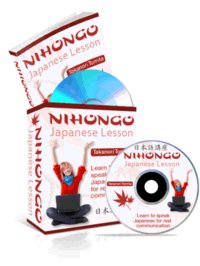
I just found an article on a website which is useful for Japanese language learners, very simple with many helpful tips!
I put it here in my blog to share it with you.
Let's read it:
Everybody says Japanese is one of the hardest languages to learn... I really don't know why though, because it's actually one of the easiest! I think the two major hurdles people are talking about when they say it's hard is that:
a) Pretty much all sentences in Japanese are structured backwards from English. Eg. English: I'm going to the supermarket now. Japanese: Now, supermarket to, I'm going.
b) Because of it's three separate "alphabets" (including the Kanji system, with over 10,000 characters! Compare that to English's 26 character system, and you'll have an idea of what I mean), It's one of the hardest written languages to learn.
So, if you look at things from that perspective, yes, it's a hard language. But really, in this day in age, what is the major purpose of learning a language?? It's to communicate, and to interact with the locals when you travel over there. And as a spoken language, Japanese is one of the easiest!
Once you get over the initial hurdle of everything being backwards, things start to make a lot more sense. The actual grammar used in everyday conversation is extremely basic - my friend attended a Japanese class for one year, and his grammar is amazing, but he doesn't speak as fluently as I do, even though I never took classes! I found the most effective way to learn the language was just to meet locals, and speak as much as possible. Mistakes are all part of the learning process - the more you make, the faster you learn. The biggest hurdle a lot of people face is that they're just too embarrassed to try and speak to locals. Don't be shy!
 So, learning a few simple grammar points should definitely be your first goal though - once you learn the grammar, you can apply it to almost any situation! Ie. You learn "I walk to the supermarket every day", and, using the same grammar, suddenly you can say things like "I play guitar twice a week", "I often watch TV in the evening", "I go to bars with my friends on Friday night" etc. etc. Lesson 1: Learn basic grammar. Many people try to learn languages using phrasebooks, and remembering set phrases - but without actually understanding each individual part of the sentence they are saying or hearing, it's very easy to quickly become confused. Eg. A beautiful girl asks you if you "want to go for a drink", but you only learned the grammar for "would you like to go for a drink", so you don't understand the first part of the sentence, fumble, and you've missed your chance. Once again, learn basic grammar. Nobody likes to do it, but it's invaluable in comprehension, and gives you a much broader range of things to speak about.
So, learning a few simple grammar points should definitely be your first goal though - once you learn the grammar, you can apply it to almost any situation! Ie. You learn "I walk to the supermarket every day", and, using the same grammar, suddenly you can say things like "I play guitar twice a week", "I often watch TV in the evening", "I go to bars with my friends on Friday night" etc. etc. Lesson 1: Learn basic grammar. Many people try to learn languages using phrasebooks, and remembering set phrases - but without actually understanding each individual part of the sentence they are saying or hearing, it's very easy to quickly become confused. Eg. A beautiful girl asks you if you "want to go for a drink", but you only learned the grammar for "would you like to go for a drink", so you don't understand the first part of the sentence, fumble, and you've missed your chance. Once again, learn basic grammar. Nobody likes to do it, but it's invaluable in comprehension, and gives you a much broader range of things to speak about. So once you've got some grammar under your belt, you're best bet is to start learning some vocab. Get a vocab book, and a notebook, and start writing your vocab down. Vocab is the key to being cool, and improving your expressions. Eg. Without vocab, you could say "Hello lady, do you like to dance and drink alcohol?", but WITH vocab you could say "Hey baby, do you wanna sip margaritas and tango in the moonlight with me?". Vocab includes nouns, verbs, and adjectives. My favorite way to do it is to think about what you do every day, then write a list of, say, all the verbs "wake up, eat, exercise, work, etc..." - then translate, and memorize them. Then do the same with all the nouns you interact with every day "door, shower, friend, racecar..." and the adjectives "cool, great, incredible, amazing, beautiful..." all of which can be translated as "sugoi" in Japanese... actually, it's probably not so important that you learn adjectives then, just learn "sugoi" and "ii"!
Learning languages is not about tests, and long nights studying at your desk, conjugating the present perfect conditional and volitional forms of verbs... now that you can speak a little Japanese, there are 120,000,000 extra people that you can communicate with in the world!!!
P.S: Don't miss out this Japanese Speaking Toolkit.
By:Adam Claydon-Platt
Source: eslteachersboard.com




No comments:
Post a Comment